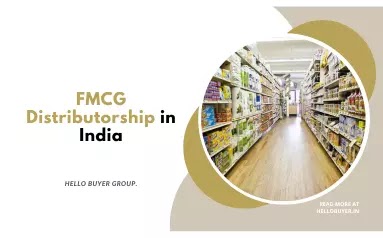FMCG Distributorship in India
Fast Moving Consumer Goods (FMCG) is a rapidly growing industry in India, which offers various opportunities for distributors to expand their business. FMCG products, such as packaged foods, personal care items, household cleaning products, and more, are in constant demand, making it a lucrative business for those who are looking to enter the industry.
Here's a comprehensive guide on FMCG distributorship in India:
Understanding FMCG Distributorship
FMCG distributorship is the process of selling FMCG products to retailers, supermarkets, and other establishments that sell consumer goods. The distributor acts as the middleman between the manufacturer and the retailer, ensuring that products are delivered on time, and retailers have a consistent supply of products.
Types of FMCG Distributors
There are several types of FMCG distributors in India. The most common types are:
- Wholesale Distributors: These are distributors that purchase large quantities of products from manufacturers and sell them to retailers at a profit. Wholesale distributors often operate from a warehouse or distribution center, and they can offer better prices to retailers due to their buying power.
- Retail Distributors: Retail distributors focus on supplying products to small retail stores or individual consumers. These distributors often have a smaller range of products and may operate from a storefront or online platform.
- Sub-Distributors: Sub-distributors purchase products from wholesale distributors and sell them to smaller retailers or individual consumers. They operate on a smaller scale than wholesale distributors and often have a limited range of products.
- Super Stockists: Super Stockists are distributors who have an extensive distribution network and are responsible for supplying products to a larger region. They often work directly with the manufacturer and have a wide range of products in their inventory.
How to Become an FMCG Distributor in India
Becoming an FMCG distributor in India requires planning, research, and investment. Here are the steps involved:
- Choose the Product Category: The first step is to select the product category you want to distribute. Consider the demand for the product, the competition in the market, and the profit margins.
- Research the Market: Conduct market research to identify potential customers, the competition in the market, and the demand for the product. This will help you determine the feasibility of your business and develop a strategy to succeed in the market.
- Identify the Manufacturer: Contact the manufacturers of the product you want to distribute and enquire about their distribution policies. Some manufacturers may require you to meet specific criteria before becoming a distributor, such as a minimum investment or experience in the industry.
- Secure the Required Licenses: Obtain the necessary licenses and permits required to start an FMCG distribution business. This includes registering your business, obtaining a GST registration, and getting a trade license from the local authority.
- Secure the Required Capital: Starting an FMCG distribution business requires a significant amount of investment. You will need to secure capital to cover the cost of purchasing inventory, renting a warehouse, hiring staff, and marketing the business.
- Develop a Distribution Strategy: Create a distribution strategy that includes identifying potential customers, the delivery system, and pricing policies. This will help you establish a strong distribution network and maximize profits.
- Build Relationships with Customers: Building strong relationships with retailers and customers is essential for the success of your business. Offer excellent customer service, quality products, and competitive prices to gain their trust and loyalty.
Challenges of FMCG Distributorship in India
FMCG distributorship in India comes with its fair share of challenges. Some of the significant challenges include:
- Intense Competition: The FMCG industry in India is highly competitive, with many players vying for a share of the market. This makes it difficult for new distributors to establish themselves in the market.
- Supply Chain Management: Managing the supply chain is a significant challenge for FMCG distributors. Timely delivery of products is crucial to maintain customer satisfaction and retaining customers. However, issues such as logistics, transportation, and warehousing can cause delays and affect the distribution network's efficiency.
- Price Sensitivity: Price sensitivity is a crucial factor in the FMCG industry. Retailers and customers are always looking for the best deal, and distributors must offer competitive prices to remain relevant in the market.
- Brand Loyalty: Brand loyalty is a significant factor in the FMCG industry, with customers often preferring products from established brands. Distributors must build relationships with manufacturers to secure the rights to distribute their products and establish brand loyalty among retailers and customers.
- Government Regulations: The FMCG industry is subject to various government regulations, including taxes, licensing, and compliance with safety standards. Distributors must comply with these regulations to avoid legal and financial penalties.
Conclusion
FMCG distributorship in India offers a lucrative opportunity for entrepreneurs looking to start a business in the industry. However, it requires careful planning, investment, and an understanding of the market and supply chain management. Overcoming the challenges of competition, supply chain management, price sensitivity, brand loyalty, and government regulations is crucial to the success of an FMCG distribution business in India. With the right strategy, dedication, and hard work, becoming an FMCG distributor in India can be a profitable venture.






